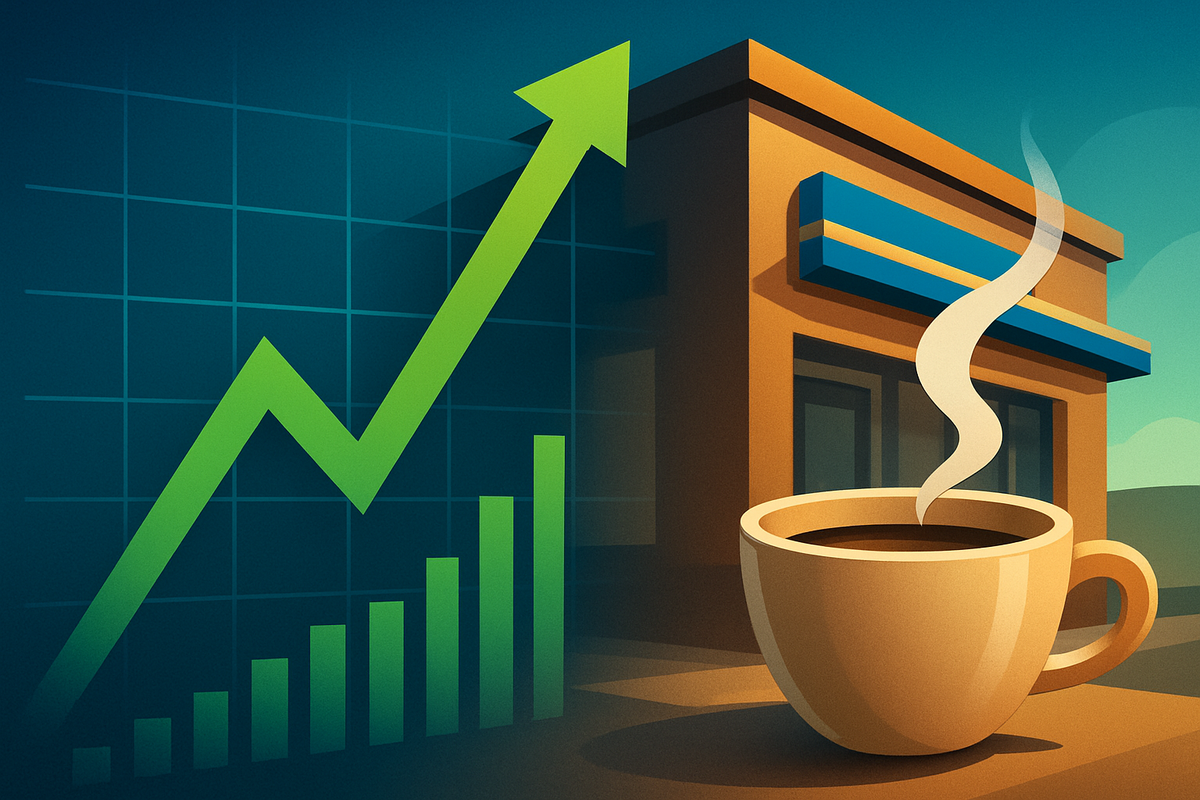Jim Cramer Doubles Down on Dutch Bros (NYSE: BROS) Amidst Earnings Rally: A Growth Story Unfolding

Financial markets are abuzz following Jim Cramer's staunch defense and bullish outlook on Dutch Bros (NYSE: BROS) stock, which recently experienced a significant rally after its latest earnings report. The popular CNBC host characterized the initial market dip post-earnings as an "unwarranted negative reaction," quickly followed by a robust recovery, signaling to investors that the drive-thru coffee chain is a compelling growth story transitioning from a regional favorite to a national powerhouse. This event highlights the volatile yet opportunity-rich nature of high-growth equities and the influence of prominent financial commentators on investor sentiment.
Cramer's analysis suggests that Wall Street initially misjudged Dutch Bros' performance, focusing on minor concerns rather than the overall strength of its "nice top and bottom line beat." He views any subsequent declines as a prime buying opportunity, particularly for long-term investors keen on companies with strong expansion trajectories and resilient business models. The immediate implication for those tracking Dutch Bros is a reinforcement of its growth narrative, prompting a closer look at its operational efficiency and market penetration strategies.
The Brewed Battle: Dutch Bros' Earnings Performance and Market Rebound
The recent market activity surrounding Dutch Bros (NYSE: BROS) was ignited by its latest earnings report, which, according to Jim Cramer, showcased a "nice top and bottom line beat." Despite these strong fundamentals, the stock initially faced an "unwarranted negative reaction," with some analysts and investors seemingly fixated on slightly lighter shop-level margins. Cramer vehemently dismissed this focus as "ridiculous," asserting that many simply "don't understand the stock or the company or the drink." This initial pullback, however, proved to be short-lived.
Following the brief dip, Dutch Bros shares rapidly rallied, a testament to what Cramer described as Wall Street "revisit[ing] the quarter and realiz[ing] it was a good one upon further review." This positive sentiment is not new; earlier in 2025, the company's shares surged nearly 25% after reporting stronger-than-expected fourth-quarter results and an optimistic outlook for the current year. Cramer has consistently lauded Dutch Bros as "the real deal," citing impressive revenue growth, robust system same-shop sales growth, and accelerated expansion plans. He also points to the company's resilience in a potentially weaker consumer environment, attributing its success to innovative menu offerings, increasing brand recognition, and enhanced digital ordering efficiency, all contributing to strong comparable sales. The key players in this unfolding drama include Dutch Bros management, who delivered the strong results, and influential market commentators like Jim Cramer, whose vocal support helped to reframe the narrative for investors.
Brewing Success: Winners and Losers in the Coffee Market
The impressive performance and subsequent market rally of Dutch Bros (NYSE: BROS), fueled by Jim Cramer's bullish endorsement, clearly position the company as a significant winner in the current financial landscape. For Dutch Bros, this event reinforces its growth trajectory, boosts investor confidence, and provides capital for its ambitious national expansion plans. The enhanced brand recognition and positive market sentiment could also attract new franchisees, further accelerating its footprint across the United States. Its focus on menu innovation and digital efficiency also positions it well to capture a younger, tech-savvy demographic.
However, Dutch Bros' rapid ascent could pose challenges for established competitors and smaller, independent coffee shops. Giants like Starbucks (NASDAQ: SBUX) and other large coffee chains, which dominate the market, might feel increased pressure to innovate and differentiate their offerings, particularly in the drive-thru segment where Dutch Bros excels. While Starbucks has a broader global presence and a different market positioning, Dutch Bros' aggressive expansion in the U.S. could chip away at its domestic market share, especially in regions where Dutch Bros establishes a strong presence. Similarly, regional coffee chains and independent operators might find it harder to compete with Dutch Bros' growing brand appeal and operational scale.
Beyond direct competitors, suppliers to the coffee industry could also see shifts. Increased demand from a rapidly expanding Dutch Bros could benefit suppliers of coffee beans, dairy products, and other ingredients, potentially leading to larger contracts and more stable demand. Conversely, suppliers heavily reliant on struggling competitors might face reduced orders. Furthermore, the success of Dutch Bros could inspire other fast-casual beverage concepts, intensifying competition across the broader food and beverage sector and potentially leading to a more dynamic and innovative market environment.
The Wider Significance: A Jolt to the Industry
The recent surge in Dutch Bros (NYSE: BROS) stock and Jim Cramer's enthusiastic backing transcend the individual company, offering a significant commentary on broader industry trends within the fast-casual and specialty beverage sectors. This event underscores the continued robust demand for convenient, high-quality, and experience-driven food and beverage options, even in an uncertain economic climate. The drive-thru model, perfected by Dutch Bros, remains a powerful engine for growth, demonstrating its resilience and consumer appeal, a trend that accelerated during and after the recent global health crisis.
The success of Dutch Bros could trigger ripple effects across the competitive landscape. Competitors, both large and small, will likely scrutinize Dutch Bros' strategy, particularly its rapid expansion, menu innovation, and digital engagement, seeking to emulate successful elements or develop counter-strategies. This could lead to an intensified arms race in customer loyalty programs, speed of service, and unique product offerings. For instance, other regional chains might see Dutch Bros as a blueprint for national expansion, potentially leading to a new wave of consolidation or increased M&A activity within the industry. While direct regulatory or policy implications are not immediately apparent from this specific event, the rapid growth of any major chain could eventually draw attention to labor practices, environmental impact, or local business regulations, particularly in areas of high new store development. Historically, the fast-food and beverage industries have seen similar periods of rapid growth and market re-alignment, where innovative players challenged established giants, much like the rise of McDonald's or Starbucks in their early decades.
What Comes Next: Navigating the Growth Trajectory
Looking ahead, the trajectory for Dutch Bros (NYSE: BROS) appears to be one of continued expansion and heightened market scrutiny. In the short term, investors can anticipate ongoing volatility. While Jim Cramer has advocated for buying on dips, the stock's high valuation (price-to-earnings multiple) suggests it may be susceptible to market-wide corrections or any perceived missteps in future earnings reports. The company will need to consistently deliver strong comparable sales growth and efficient new store openings to justify its premium. Analysts will be keenly watching the balance between aggressive expansion and maintaining healthy shop-level margins, the very metric that initially caused a brief market wobble.
In the long term, Dutch Bros' success hinges on its ability to execute its national expansion strategy effectively while preserving its unique brand culture and customer loyalty. This will involve strategic real estate acquisition, efficient supply chain management, and continued investment in menu innovation and digital platforms. Potential strategic pivots might include further diversification of its beverage and food offerings or exploring new market formats beyond its traditional drive-thru model. Market opportunities lie in underserved geographic areas and the continued growth of the specialty coffee segment, while challenges include intense competition, rising input costs, and the need to maintain operational consistency across a rapidly growing footprint. Potential scenarios range from Dutch Bros solidifying its position as a major national player, continuing its impressive growth, to facing headwinds if expansion costs outpace revenue growth or if competitive pressures intensify beyond current expectations.
A Caffeinated Future: Summarizing the Market's Buzz
The recent market activity surrounding Dutch Bros (NYSE: BROS), emphatically championed by Jim Cramer, underscores a pivotal moment for the rapidly expanding drive-thru coffee chain. The key takeaway is clear: despite initial market jitters over minor margin concerns, Dutch Bros delivered a robust earnings performance that reinforces its narrative as a compelling growth story. Cramer's bullish stance highlights what he perceives as a market misunderstanding of the company's fundamental strength and its potential to transition from a regional favorite to a national powerhouse. For investors, this event has re-emphasized the importance of discerning long-term growth potential amidst short-term market reactions.
Moving forward, the market will undoubtedly keep a close eye on Dutch Bros. Its ability to sustain impressive comparable sales growth, manage the costs associated with aggressive national expansion, and continue innovating its menu and digital offerings will be crucial. The lasting impact of this event is likely to be Dutch Bros solidifying its position as a significant player in the U.S. beverage market, intensifying competition for established giants like Starbucks (NASDAQ: SBUX) and inspiring other fast-casual concepts. Investors should watch for future earnings reports, paying close attention to new store opening guidance, system-wide sales, and any shifts in profit margins. The saga of Dutch Bros is a testament to the dynamic nature of the financial markets, where strong performance, coupled with influential commentary, can quickly reshape investor perception and market valuation.
This content is intended for informational purposes only and is not financial advice



